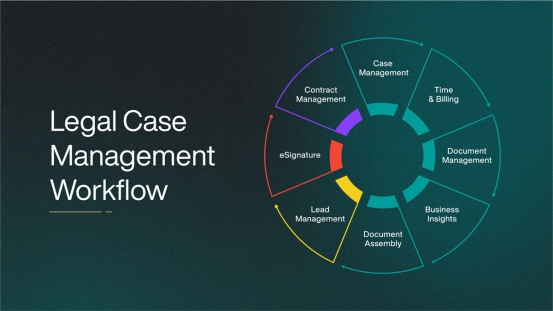Lawyer
Essential Insights into Legal Case Management Software Systems
Law firms in the U.S. face growing challenges in handling cases, client communications, and compliance requirements. Legal case management software addresses these issues by centralizing information, automating tasks, and boosting efficiency so attorneys can concentrate on delivering excellent client service.
Law firms in the U.S. face growing challenges in handling cases, client communications, and compliance requirements. Legal case management software addresses these issues by centralizing information, automating tasks, and boosting efficiency so attorneys can concentrate on delivering excellent client service.

What is Legal Case Management Software?
Legal case management software is a specialized solution designed to help attorneys, legal departments, and small to mid-sized firms manage their cases more effectively. It consolidates critical case information—such as documents, schedules, deadlines, client communications, and billing—into a single platform. These systems streamline workflows, cut down on administrative burdens, and strengthen collaboration across legal teams.
Key Features of Legal Case Management Software
-
Document Management: Secure storage with easy access to case documents.
-
Calendar and Deadline Tracking: Tools for managing hearings, meetings, and filing deadlines.
-
Billing and Time Tracking: Automated invoicing and accurate billable hour tracking.
-
Client Communication Management: Centralized messaging and correspondence tracking.
-
Task Automation: Tools to handle repetitive processes like form generation and case updates.
-
Compliance Tools: Built-in features to support U.S. regulations such as HIPAA and data privacy requirements.
Why Legal Case Management Software is Essential
1. Improved Efficiency
Automating repetitive tasks frees up attorneys to focus on legal strategy and client representation.
Example: Automated document preparation can cut time spent on routine paperwork by nearly 50%, according to industry research.
Key Benefits:
-
Faster access to case files.
-
Streamlined client intake.
2. Enhanced Collaboration
With shared access to centralized case files, legal teams work together more effectively.
Example: Cloud platforms allow multiple team members to update or review a case simultaneously, regardless of location.
Key Benefits:
-
Better team communication.
-
Reduced chance of missed deadlines.
3. Better Client Management
Centralized systems ensure all client information is available in one place, making interactions smoother and more responsive.
Example: Automatic reminders keep clients informed about meetings, hearings, and deadlines.
Key Benefits:
-
Stronger client trust and retention.
-
Faster response times.
4. Cost and Time Savings
Although these systems require an initial investment, they help law firms save in the long run.
Key Benefits:
-
Lower administrative costs.
-
More billable hours tracked accurately.
5. Regulatory Compliance
Legal software supports compliance with U.S. data protection and privacy regulations, reducing risk of penalties.
Key Benefits:
-
Encrypted data storage.
-
Built-in compliance features.
Types of Legal Case Management Software
1. Cloud-Based Systems
Hosted online and accessible through any web-enabled device.
Advantages: Automatic updates, flexible access.
Best For: Small firms, remote teams.
2. On-Premises Systems
Installed locally and maintained by the firm’s IT department.
Advantages: Maximum control and customization.
Best For: Larger firms with in-house IT support.
3. Free Legal Case Management Software
Basic platforms offering limited features, suitable for smaller practices.
Advantages: Low or no upfront cost.
Best For: Solo practitioners and start-ups.
4. Specialized Legal Software
Designed for niche areas of law, such as family law, criminal defense, or intellectual property.
Advantages: Tailored tools and compliance features.
Best For: Firms with specific practice focuses.
Comparing Popular Legal Case Management Software Systems
| Software | Key Features | Cost (Monthly) | Best For |
| Clio | Time tracking, billing, documents | $49–$109 | Small to mid-sized firms |
| LEAP | All-in-one platform, automation | $95+ | Medium-sized firms |
| Actionstep | Workflow automation, cloud-based | $50–$125 | Firms needing customization |
| Zola Suite | Email integration, document handling | $59–$89 | Small firms and start-ups |
| PracticePanther | Client portal, calendar integration | $39–$79 | Solo and small practices |
Competitive Points
Clio
Popular for ease of use and strong integrations with Google Workspace and Microsoft 365.
Strengths: Flexible pricing, excellent support.
Weaknesses: Limited customization for complex needs.
LEAP
Offers robust tools, including U.S. compliance features and built-in legal forms.
Strengths: Industry-specific functionality.
Weaknesses: Higher cost compared to some alternatives.
Actionstep
Known for automation and customizable workflows.
Strengths: Flexible and adaptable.
Weaknesses: Requires training to master.
Zola Suite
Strong focus on email and client communication.
Strengths: Affordable and communication-friendly.
Weaknesses: Fewer advanced tools for larger firms.
How to Choose the Right System
-
Assess Your Needs: Identify whether your firm prioritizes workflow automation, compliance tools, or client portals.
-
Set a Budget: Compare pricing tiers to find a system that balances cost and features.
-
Test the Software: Use free trials or demos to evaluate usability and fit.
-
Get Team Feedback: Ensure the platform works for attorneys, paralegals, and administrative staff alike.
Frequently Asked Questions
Q: Is legal case management software worth it?
A: Yes. It improves efficiency, ensures compliance, and reduces administrative burdens, saving firms time and money.
Q: Can small firms afford it?
A: Yes. Affordable options exist, including PracticePanther and entry-level versions of Clio.
Q: Are cloud-based systems secure?
A: Reputable providers use encryption, backups, and compliance measures to safeguard data.
Q: How long does implementation take?
A: Most firms can deploy systems in 2–6 weeks depending on complexity.
Q: Can we switch providers later?
A: Yes, though it’s important to confirm data export and migration policies in advance.
Legal case management software is transforming U.S. law firms by streamlining operations, enhancing collaboration, and ensuring compliance. By adopting these systems, attorneys can focus more on advocacy and client service rather than administrative work.
References
https://www.practicepanther.com
How do you like this article?




